HNC/D Business: Contract Law & Negligence Application Report
VerifiedAdded on 2023/06/15
|18
|4762
|242
Report
AI Summary
This assignment provides a detailed analysis of contract law and negligence principles in a business context. It covers essential elements of a valid contract, including offer, acceptance, consideration, intention, clarity, and capacity, illustrating these with relevant case law such as Pharmaceutical Society of Great Britain v Boots and Carlill v Carbolic Smoke Ball Company. The report also discusses unilateral and bilateral contracts, exclusion clauses, and their validity, referencing Thornton v Shoe Lane Parking Ltd. Furthermore, the assignment applies these principles to specific business scenarios, addressing issues related to contract formation and the limitation of liability through exclusion clauses, considering the impact of the Unfair Contract Terms Act (UCTA) and the Consumer Rights Act (CRA). The analysis includes case studies involving Colin and Moran, and Colin's park, providing practical implications and recommendations.

Paraphrase This Document
Need a fresh take? Get an instant paraphrase of this document with our AI Paraphraser
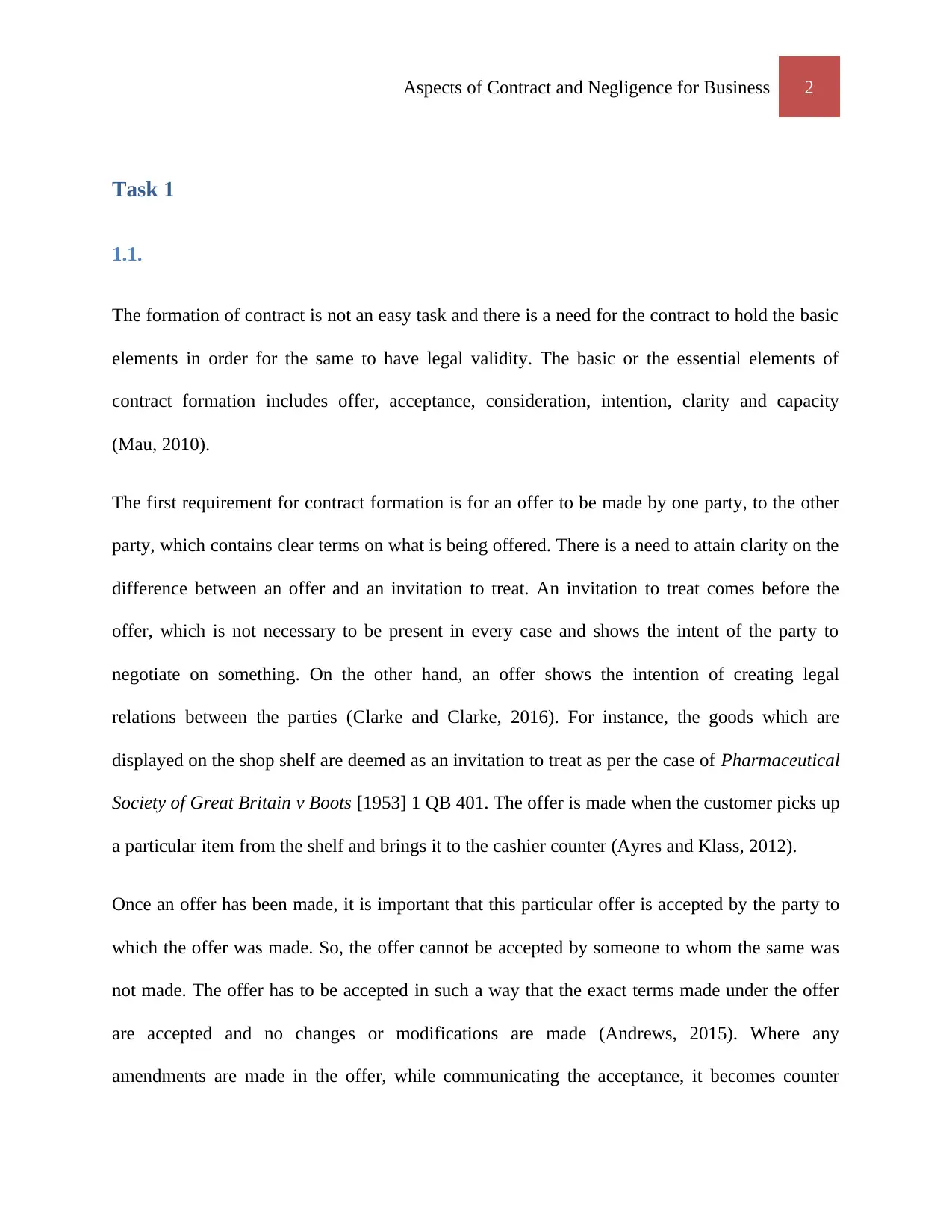
Aspects of Contract and Negligence for Business 2
Task 1
1.1.
The formation of contract is not an easy task and there is a need for the contract to hold the basic
elements in order for the same to have legal validity. The basic or the essential elements of
contract formation includes offer, acceptance, consideration, intention, clarity and capacity
(Mau, 2010).
The first requirement for contract formation is for an offer to be made by one party, to the other
party, which contains clear terms on what is being offered. There is a need to attain clarity on the
difference between an offer and an invitation to treat. An invitation to treat comes before the
offer, which is not necessary to be present in every case and shows the intent of the party to
negotiate on something. On the other hand, an offer shows the intention of creating legal
relations between the parties (Clarke and Clarke, 2016). For instance, the goods which are
displayed on the shop shelf are deemed as an invitation to treat as per the case of Pharmaceutical
Society of Great Britain v Boots [1953] 1 QB 401. The offer is made when the customer picks up
a particular item from the shelf and brings it to the cashier counter (Ayres and Klass, 2012).
Once an offer has been made, it is important that this particular offer is accepted by the party to
which the offer was made. So, the offer cannot be accepted by someone to whom the same was
not made. The offer has to be accepted in such a way that the exact terms made under the offer
are accepted and no changes or modifications are made (Andrews, 2015). Where any
amendments are made in the offer, while communicating the acceptance, it becomes counter
Task 1
1.1.
The formation of contract is not an easy task and there is a need for the contract to hold the basic
elements in order for the same to have legal validity. The basic or the essential elements of
contract formation includes offer, acceptance, consideration, intention, clarity and capacity
(Mau, 2010).
The first requirement for contract formation is for an offer to be made by one party, to the other
party, which contains clear terms on what is being offered. There is a need to attain clarity on the
difference between an offer and an invitation to treat. An invitation to treat comes before the
offer, which is not necessary to be present in every case and shows the intent of the party to
negotiate on something. On the other hand, an offer shows the intention of creating legal
relations between the parties (Clarke and Clarke, 2016). For instance, the goods which are
displayed on the shop shelf are deemed as an invitation to treat as per the case of Pharmaceutical
Society of Great Britain v Boots [1953] 1 QB 401. The offer is made when the customer picks up
a particular item from the shelf and brings it to the cashier counter (Ayres and Klass, 2012).
Once an offer has been made, it is important that this particular offer is accepted by the party to
which the offer was made. So, the offer cannot be accepted by someone to whom the same was
not made. The offer has to be accepted in such a way that the exact terms made under the offer
are accepted and no changes or modifications are made (Andrews, 2015). Where any
amendments are made in the offer, while communicating the acceptance, it becomes counter
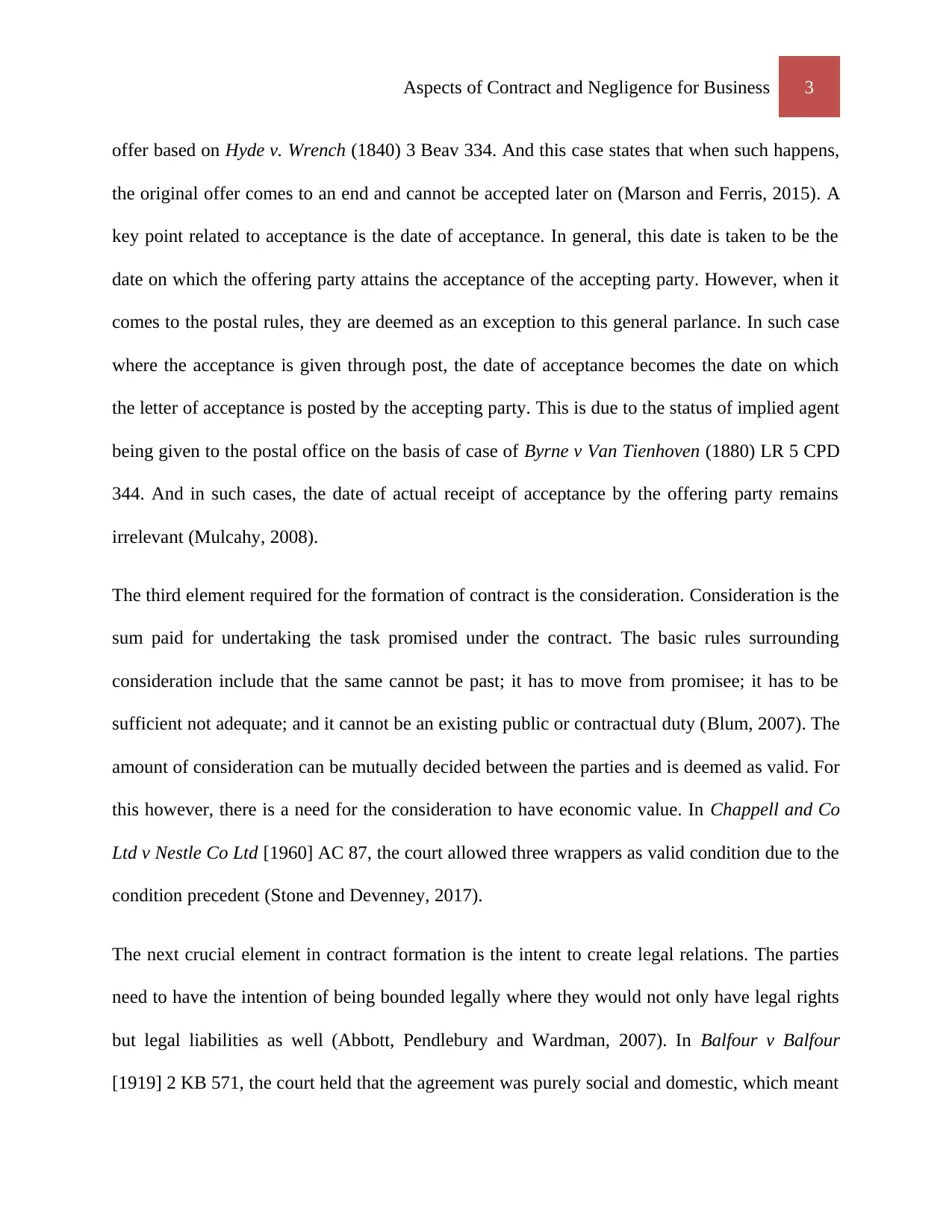
Aspects of Contract and Negligence for Business 3
offer based on Hyde v. Wrench (1840) 3 Beav 334. And this case states that when such happens,
the original offer comes to an end and cannot be accepted later on (Marson and Ferris, 2015). A
key point related to acceptance is the date of acceptance. In general, this date is taken to be the
date on which the offering party attains the acceptance of the accepting party. However, when it
comes to the postal rules, they are deemed as an exception to this general parlance. In such case
where the acceptance is given through post, the date of acceptance becomes the date on which
the letter of acceptance is posted by the accepting party. This is due to the status of implied agent
being given to the postal office on the basis of case of Byrne v Van Tienhoven (1880) LR 5 CPD
344. And in such cases, the date of actual receipt of acceptance by the offering party remains
irrelevant (Mulcahy, 2008).
The third element required for the formation of contract is the consideration. Consideration is the
sum paid for undertaking the task promised under the contract. The basic rules surrounding
consideration include that the same cannot be past; it has to move from promisee; it has to be
sufficient not adequate; and it cannot be an existing public or contractual duty (Blum, 2007). The
amount of consideration can be mutually decided between the parties and is deemed as valid. For
this however, there is a need for the consideration to have economic value. In Chappell and Co
Ltd v Nestle Co Ltd [1960] AC 87, the court allowed three wrappers as valid condition due to the
condition precedent (Stone and Devenney, 2017).
The next crucial element in contract formation is the intent to create legal relations. The parties
need to have the intention of being bounded legally where they would not only have legal rights
but legal liabilities as well (Abbott, Pendlebury and Wardman, 2007). In Balfour v Balfour
[1919] 2 KB 571, the court held that the agreement was purely social and domestic, which meant
offer based on Hyde v. Wrench (1840) 3 Beav 334. And this case states that when such happens,
the original offer comes to an end and cannot be accepted later on (Marson and Ferris, 2015). A
key point related to acceptance is the date of acceptance. In general, this date is taken to be the
date on which the offering party attains the acceptance of the accepting party. However, when it
comes to the postal rules, they are deemed as an exception to this general parlance. In such case
where the acceptance is given through post, the date of acceptance becomes the date on which
the letter of acceptance is posted by the accepting party. This is due to the status of implied agent
being given to the postal office on the basis of case of Byrne v Van Tienhoven (1880) LR 5 CPD
344. And in such cases, the date of actual receipt of acceptance by the offering party remains
irrelevant (Mulcahy, 2008).
The third element required for the formation of contract is the consideration. Consideration is the
sum paid for undertaking the task promised under the contract. The basic rules surrounding
consideration include that the same cannot be past; it has to move from promisee; it has to be
sufficient not adequate; and it cannot be an existing public or contractual duty (Blum, 2007). The
amount of consideration can be mutually decided between the parties and is deemed as valid. For
this however, there is a need for the consideration to have economic value. In Chappell and Co
Ltd v Nestle Co Ltd [1960] AC 87, the court allowed three wrappers as valid condition due to the
condition precedent (Stone and Devenney, 2017).
The next crucial element in contract formation is the intent to create legal relations. The parties
need to have the intention of being bounded legally where they would not only have legal rights
but legal liabilities as well (Abbott, Pendlebury and Wardman, 2007). In Balfour v Balfour
[1919] 2 KB 571, the court held that the agreement was purely social and domestic, which meant
⊘ This is a preview!⊘
Do you want full access?
Subscribe today to unlock all pages.

Trusted by 1+ million students worldwide
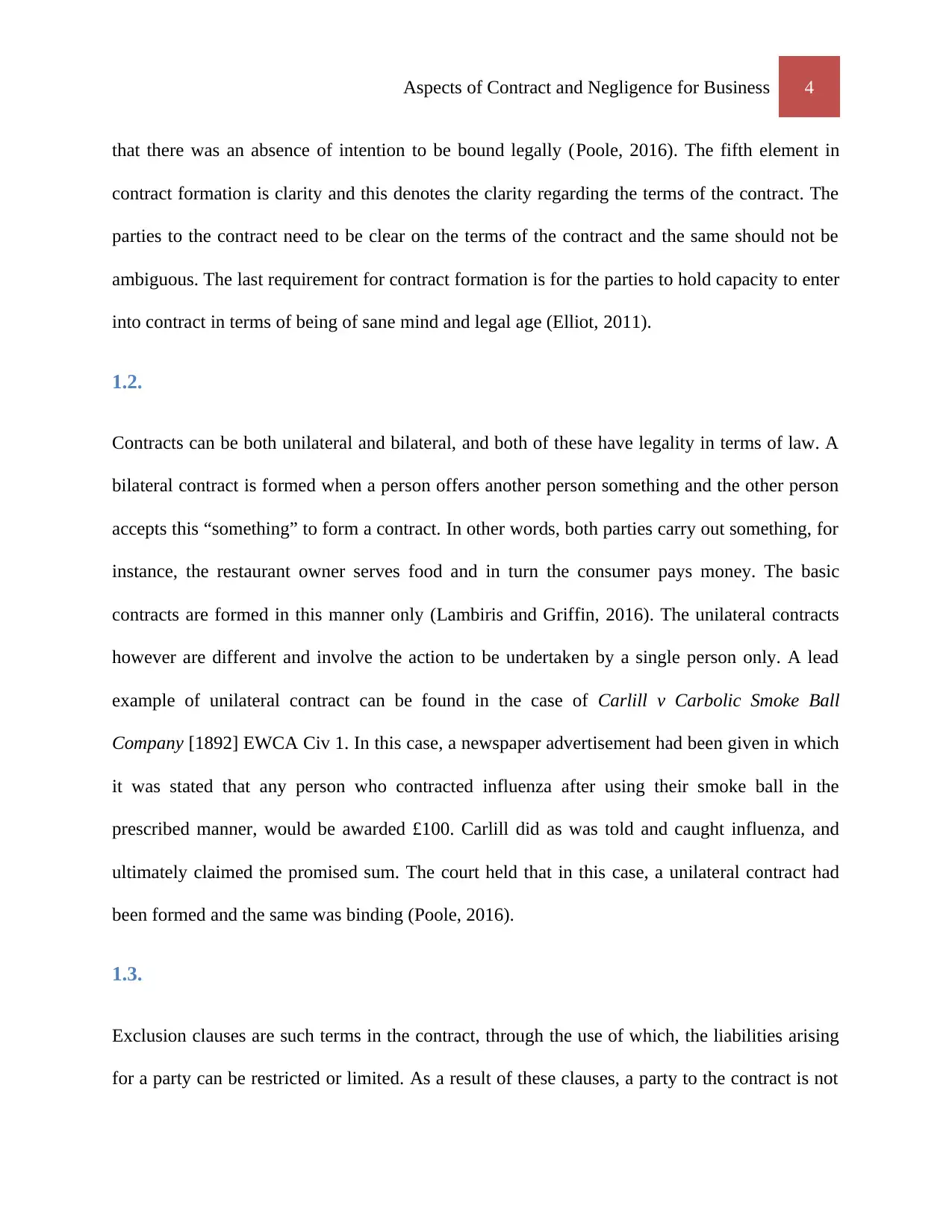
Aspects of Contract and Negligence for Business 4
that there was an absence of intention to be bound legally (Poole, 2016). The fifth element in
contract formation is clarity and this denotes the clarity regarding the terms of the contract. The
parties to the contract need to be clear on the terms of the contract and the same should not be
ambiguous. The last requirement for contract formation is for the parties to hold capacity to enter
into contract in terms of being of sane mind and legal age (Elliot, 2011).
1.2.
Contracts can be both unilateral and bilateral, and both of these have legality in terms of law. A
bilateral contract is formed when a person offers another person something and the other person
accepts this “something” to form a contract. In other words, both parties carry out something, for
instance, the restaurant owner serves food and in turn the consumer pays money. The basic
contracts are formed in this manner only (Lambiris and Griffin, 2016). The unilateral contracts
however are different and involve the action to be undertaken by a single person only. A lead
example of unilateral contract can be found in the case of Carlill v Carbolic Smoke Ball
Company [1892] EWCA Civ 1. In this case, a newspaper advertisement had been given in which
it was stated that any person who contracted influenza after using their smoke ball in the
prescribed manner, would be awarded £100. Carlill did as was told and caught influenza, and
ultimately claimed the promised sum. The court held that in this case, a unilateral contract had
been formed and the same was binding (Poole, 2016).
1.3.
Exclusion clauses are such terms in the contract, through the use of which, the liabilities arising
for a party can be restricted or limited. As a result of these clauses, a party to the contract is not
that there was an absence of intention to be bound legally (Poole, 2016). The fifth element in
contract formation is clarity and this denotes the clarity regarding the terms of the contract. The
parties to the contract need to be clear on the terms of the contract and the same should not be
ambiguous. The last requirement for contract formation is for the parties to hold capacity to enter
into contract in terms of being of sane mind and legal age (Elliot, 2011).
1.2.
Contracts can be both unilateral and bilateral, and both of these have legality in terms of law. A
bilateral contract is formed when a person offers another person something and the other person
accepts this “something” to form a contract. In other words, both parties carry out something, for
instance, the restaurant owner serves food and in turn the consumer pays money. The basic
contracts are formed in this manner only (Lambiris and Griffin, 2016). The unilateral contracts
however are different and involve the action to be undertaken by a single person only. A lead
example of unilateral contract can be found in the case of Carlill v Carbolic Smoke Ball
Company [1892] EWCA Civ 1. In this case, a newspaper advertisement had been given in which
it was stated that any person who contracted influenza after using their smoke ball in the
prescribed manner, would be awarded £100. Carlill did as was told and caught influenza, and
ultimately claimed the promised sum. The court held that in this case, a unilateral contract had
been formed and the same was binding (Poole, 2016).
1.3.
Exclusion clauses are such terms in the contract, through the use of which, the liabilities arising
for a party can be restricted or limited. As a result of these clauses, a party to the contract is not
Paraphrase This Document
Need a fresh take? Get an instant paraphrase of this document with our AI Paraphraser
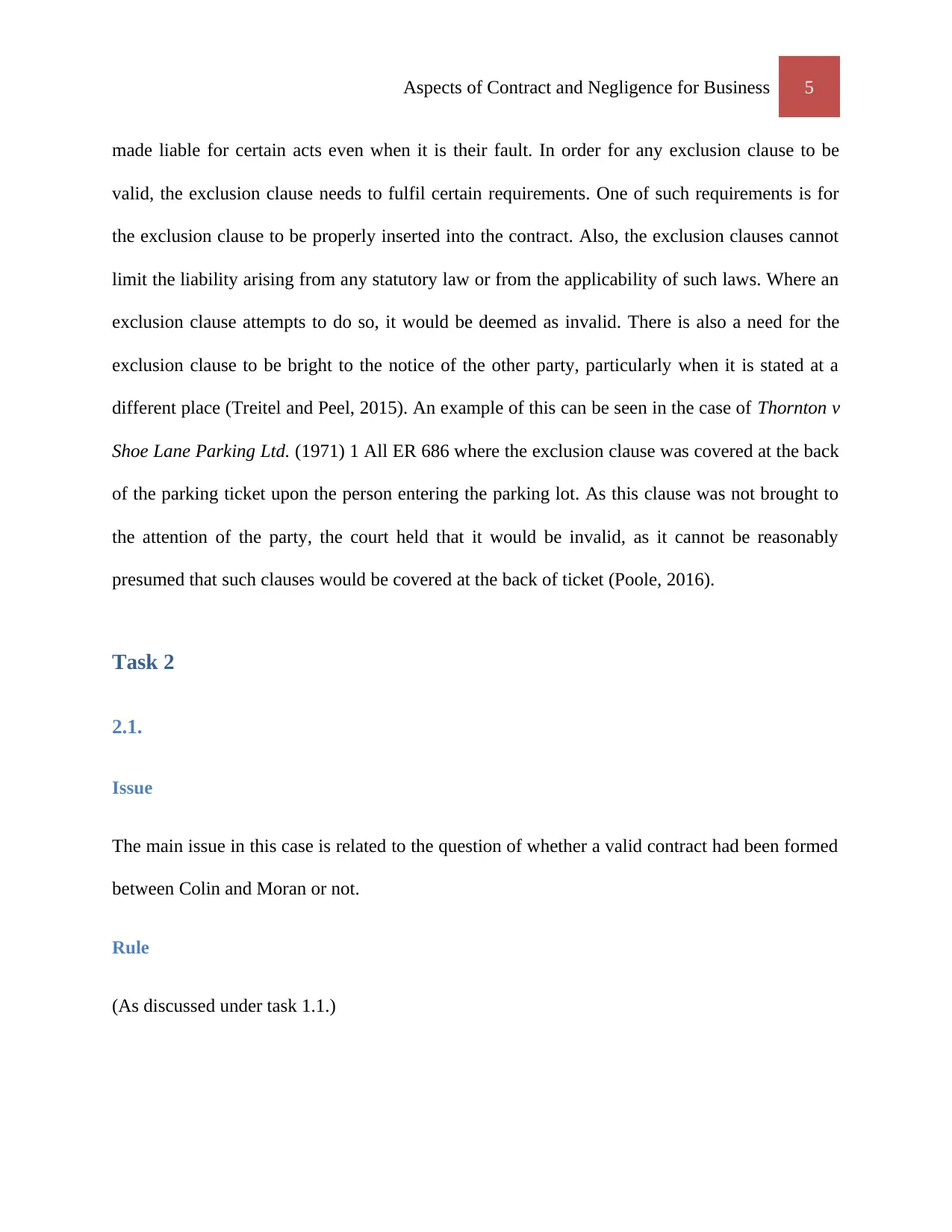
Aspects of Contract and Negligence for Business 5
made liable for certain acts even when it is their fault. In order for any exclusion clause to be
valid, the exclusion clause needs to fulfil certain requirements. One of such requirements is for
the exclusion clause to be properly inserted into the contract. Also, the exclusion clauses cannot
limit the liability arising from any statutory law or from the applicability of such laws. Where an
exclusion clause attempts to do so, it would be deemed as invalid. There is also a need for the
exclusion clause to be bright to the notice of the other party, particularly when it is stated at a
different place (Treitel and Peel, 2015). An example of this can be seen in the case of Thornton v
Shoe Lane Parking Ltd. (1971) 1 All ER 686 where the exclusion clause was covered at the back
of the parking ticket upon the person entering the parking lot. As this clause was not brought to
the attention of the party, the court held that it would be invalid, as it cannot be reasonably
presumed that such clauses would be covered at the back of ticket (Poole, 2016).
Task 2
2.1.
Issue
The main issue in this case is related to the question of whether a valid contract had been formed
between Colin and Moran or not.
Rule
(As discussed under task 1.1.)
made liable for certain acts even when it is their fault. In order for any exclusion clause to be
valid, the exclusion clause needs to fulfil certain requirements. One of such requirements is for
the exclusion clause to be properly inserted into the contract. Also, the exclusion clauses cannot
limit the liability arising from any statutory law or from the applicability of such laws. Where an
exclusion clause attempts to do so, it would be deemed as invalid. There is also a need for the
exclusion clause to be bright to the notice of the other party, particularly when it is stated at a
different place (Treitel and Peel, 2015). An example of this can be seen in the case of Thornton v
Shoe Lane Parking Ltd. (1971) 1 All ER 686 where the exclusion clause was covered at the back
of the parking ticket upon the person entering the parking lot. As this clause was not brought to
the attention of the party, the court held that it would be invalid, as it cannot be reasonably
presumed that such clauses would be covered at the back of ticket (Poole, 2016).
Task 2
2.1.
Issue
The main issue in this case is related to the question of whether a valid contract had been formed
between Colin and Moran or not.
Rule
(As discussed under task 1.1.)
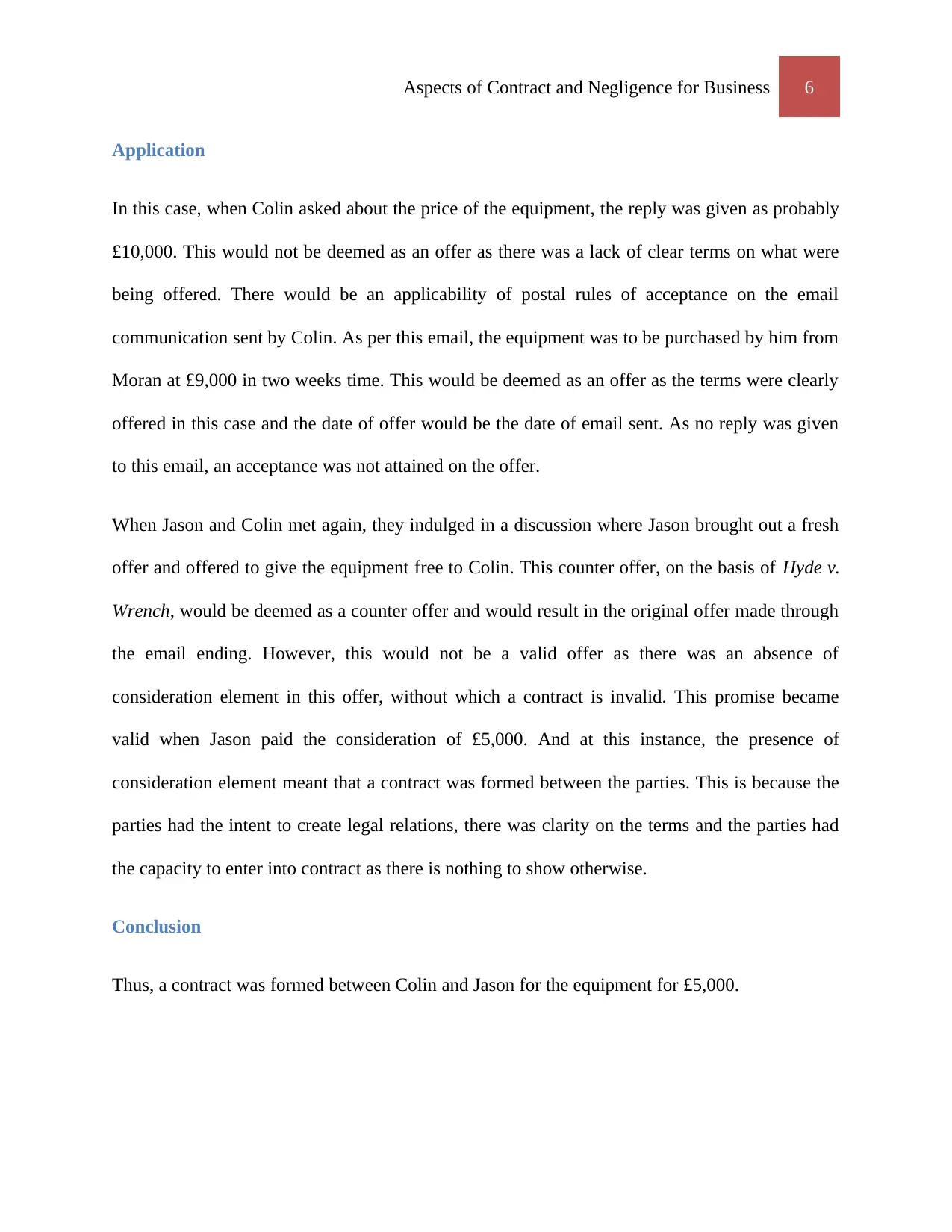
Aspects of Contract and Negligence for Business 6
Application
In this case, when Colin asked about the price of the equipment, the reply was given as probably
£10,000. This would not be deemed as an offer as there was a lack of clear terms on what were
being offered. There would be an applicability of postal rules of acceptance on the email
communication sent by Colin. As per this email, the equipment was to be purchased by him from
Moran at £9,000 in two weeks time. This would be deemed as an offer as the terms were clearly
offered in this case and the date of offer would be the date of email sent. As no reply was given
to this email, an acceptance was not attained on the offer.
When Jason and Colin met again, they indulged in a discussion where Jason brought out a fresh
offer and offered to give the equipment free to Colin. This counter offer, on the basis of Hyde v.
Wrench, would be deemed as a counter offer and would result in the original offer made through
the email ending. However, this would not be a valid offer as there was an absence of
consideration element in this offer, without which a contract is invalid. This promise became
valid when Jason paid the consideration of £5,000. And at this instance, the presence of
consideration element meant that a contract was formed between the parties. This is because the
parties had the intent to create legal relations, there was clarity on the terms and the parties had
the capacity to enter into contract as there is nothing to show otherwise.
Conclusion
Thus, a contract was formed between Colin and Jason for the equipment for £5,000.
Application
In this case, when Colin asked about the price of the equipment, the reply was given as probably
£10,000. This would not be deemed as an offer as there was a lack of clear terms on what were
being offered. There would be an applicability of postal rules of acceptance on the email
communication sent by Colin. As per this email, the equipment was to be purchased by him from
Moran at £9,000 in two weeks time. This would be deemed as an offer as the terms were clearly
offered in this case and the date of offer would be the date of email sent. As no reply was given
to this email, an acceptance was not attained on the offer.
When Jason and Colin met again, they indulged in a discussion where Jason brought out a fresh
offer and offered to give the equipment free to Colin. This counter offer, on the basis of Hyde v.
Wrench, would be deemed as a counter offer and would result in the original offer made through
the email ending. However, this would not be a valid offer as there was an absence of
consideration element in this offer, without which a contract is invalid. This promise became
valid when Jason paid the consideration of £5,000. And at this instance, the presence of
consideration element meant that a contract was formed between the parties. This is because the
parties had the intent to create legal relations, there was clarity on the terms and the parties had
the capacity to enter into contract as there is nothing to show otherwise.
Conclusion
Thus, a contract was formed between Colin and Jason for the equipment for £5,000.
⊘ This is a preview!⊘
Do you want full access?
Subscribe today to unlock all pages.

Trusted by 1+ million students worldwide
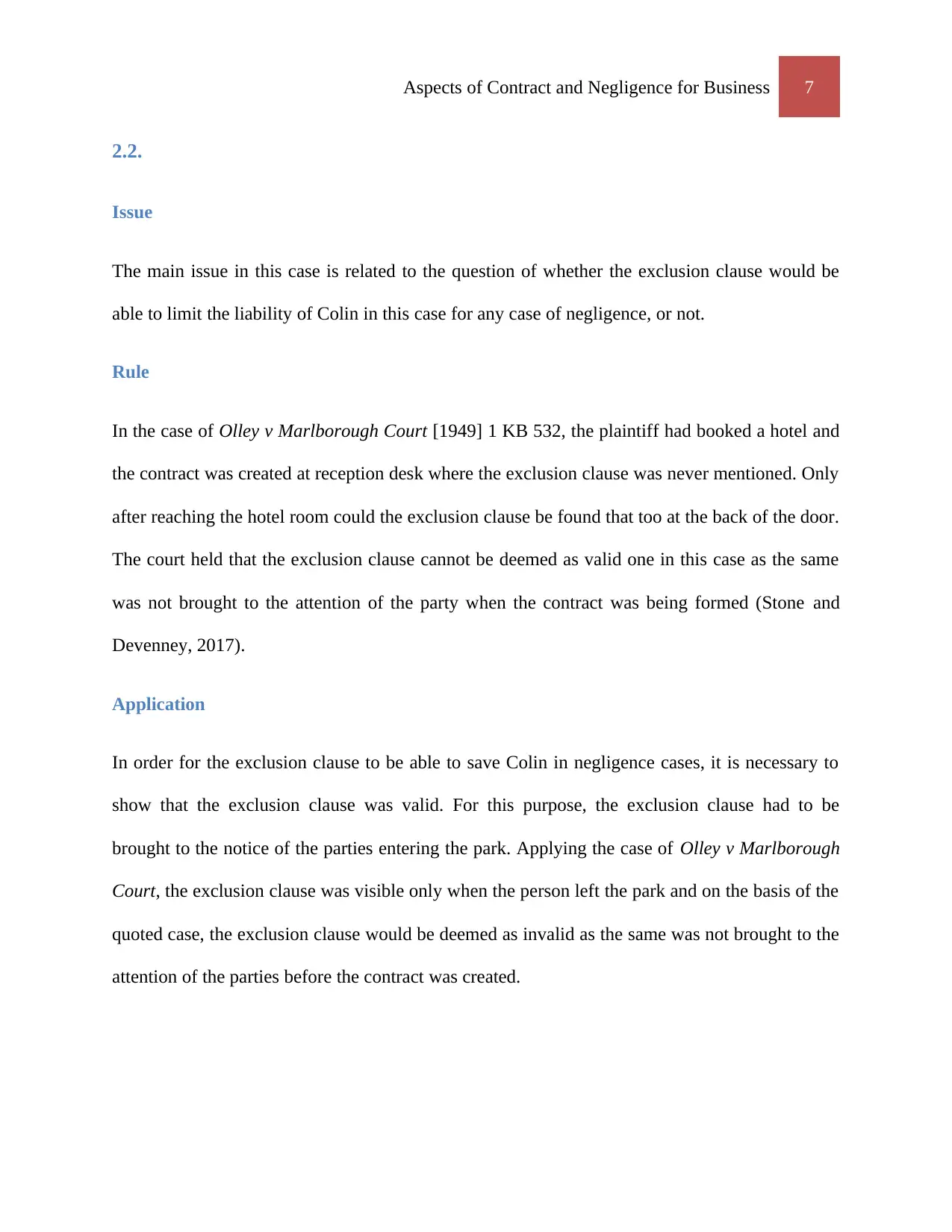
Aspects of Contract and Negligence for Business 7
2.2.
Issue
The main issue in this case is related to the question of whether the exclusion clause would be
able to limit the liability of Colin in this case for any case of negligence, or not.
Rule
In the case of Olley v Marlborough Court [1949] 1 KB 532, the plaintiff had booked a hotel and
the contract was created at reception desk where the exclusion clause was never mentioned. Only
after reaching the hotel room could the exclusion clause be found that too at the back of the door.
The court held that the exclusion clause cannot be deemed as valid one in this case as the same
was not brought to the attention of the party when the contract was being formed (Stone and
Devenney, 2017).
Application
In order for the exclusion clause to be able to save Colin in negligence cases, it is necessary to
show that the exclusion clause was valid. For this purpose, the exclusion clause had to be
brought to the notice of the parties entering the park. Applying the case of Olley v Marlborough
Court, the exclusion clause was visible only when the person left the park and on the basis of the
quoted case, the exclusion clause would be deemed as invalid as the same was not brought to the
attention of the parties before the contract was created.
2.2.
Issue
The main issue in this case is related to the question of whether the exclusion clause would be
able to limit the liability of Colin in this case for any case of negligence, or not.
Rule
In the case of Olley v Marlborough Court [1949] 1 KB 532, the plaintiff had booked a hotel and
the contract was created at reception desk where the exclusion clause was never mentioned. Only
after reaching the hotel room could the exclusion clause be found that too at the back of the door.
The court held that the exclusion clause cannot be deemed as valid one in this case as the same
was not brought to the attention of the party when the contract was being formed (Stone and
Devenney, 2017).
Application
In order for the exclusion clause to be able to save Colin in negligence cases, it is necessary to
show that the exclusion clause was valid. For this purpose, the exclusion clause had to be
brought to the notice of the parties entering the park. Applying the case of Olley v Marlborough
Court, the exclusion clause was visible only when the person left the park and on the basis of the
quoted case, the exclusion clause would be deemed as invalid as the same was not brought to the
attention of the parties before the contract was created.
Paraphrase This Document
Need a fresh take? Get an instant paraphrase of this document with our AI Paraphraser
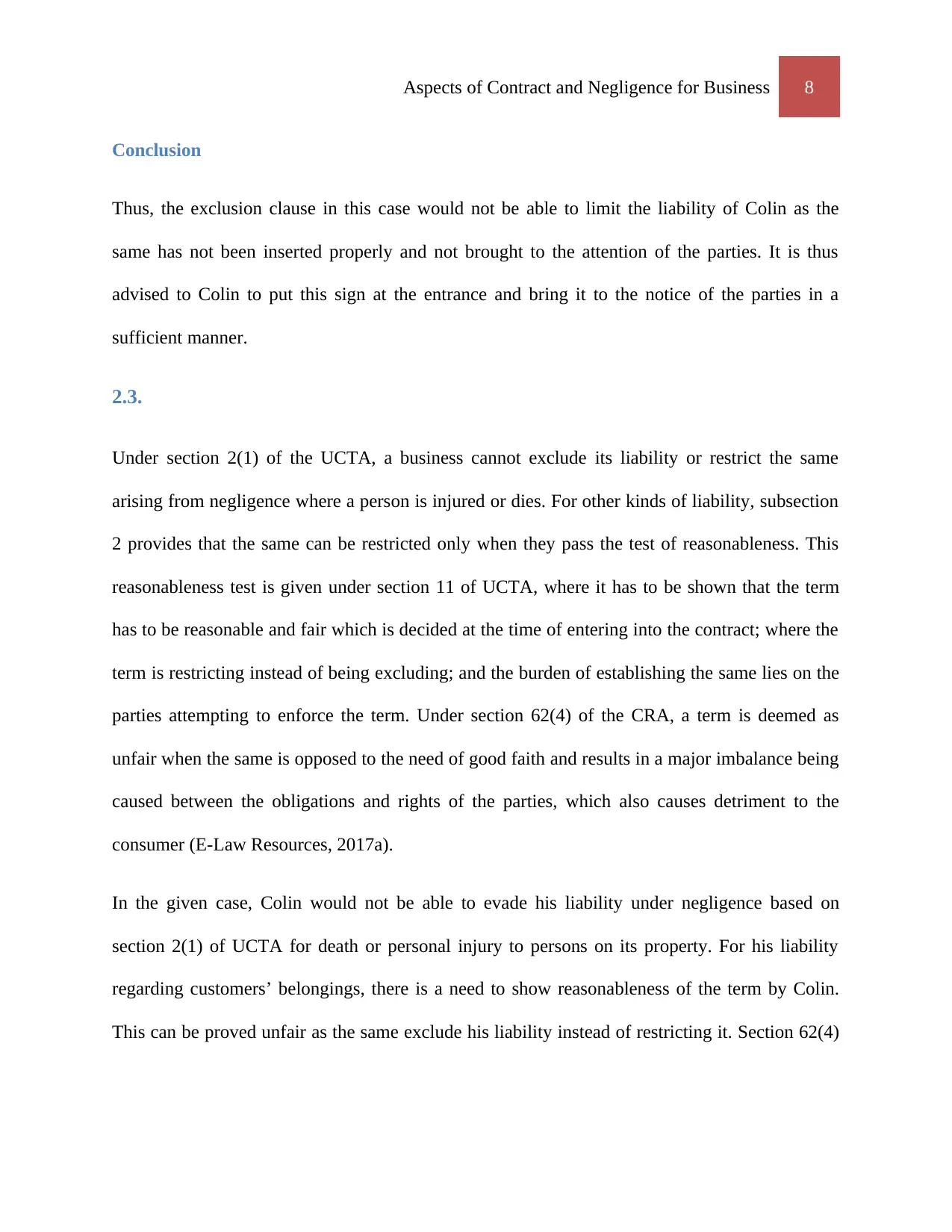
Aspects of Contract and Negligence for Business 8
Conclusion
Thus, the exclusion clause in this case would not be able to limit the liability of Colin as the
same has not been inserted properly and not brought to the attention of the parties. It is thus
advised to Colin to put this sign at the entrance and bring it to the notice of the parties in a
sufficient manner.
2.3.
Under section 2(1) of the UCTA, a business cannot exclude its liability or restrict the same
arising from negligence where a person is injured or dies. For other kinds of liability, subsection
2 provides that the same can be restricted only when they pass the test of reasonableness. This
reasonableness test is given under section 11 of UCTA, where it has to be shown that the term
has to be reasonable and fair which is decided at the time of entering into the contract; where the
term is restricting instead of being excluding; and the burden of establishing the same lies on the
parties attempting to enforce the term. Under section 62(4) of the CRA, a term is deemed as
unfair when the same is opposed to the need of good faith and results in a major imbalance being
caused between the obligations and rights of the parties, which also causes detriment to the
consumer (E-Law Resources, 2017a).
In the given case, Colin would not be able to evade his liability under negligence based on
section 2(1) of UCTA for death or personal injury to persons on its property. For his liability
regarding customers’ belongings, there is a need to show reasonableness of the term by Colin.
This can be proved unfair as the same exclude his liability instead of restricting it. Section 62(4)
Conclusion
Thus, the exclusion clause in this case would not be able to limit the liability of Colin as the
same has not been inserted properly and not brought to the attention of the parties. It is thus
advised to Colin to put this sign at the entrance and bring it to the notice of the parties in a
sufficient manner.
2.3.
Under section 2(1) of the UCTA, a business cannot exclude its liability or restrict the same
arising from negligence where a person is injured or dies. For other kinds of liability, subsection
2 provides that the same can be restricted only when they pass the test of reasonableness. This
reasonableness test is given under section 11 of UCTA, where it has to be shown that the term
has to be reasonable and fair which is decided at the time of entering into the contract; where the
term is restricting instead of being excluding; and the burden of establishing the same lies on the
parties attempting to enforce the term. Under section 62(4) of the CRA, a term is deemed as
unfair when the same is opposed to the need of good faith and results in a major imbalance being
caused between the obligations and rights of the parties, which also causes detriment to the
consumer (E-Law Resources, 2017a).
In the given case, Colin would not be able to evade his liability under negligence based on
section 2(1) of UCTA for death or personal injury to persons on its property. For his liability
regarding customers’ belongings, there is a need to show reasonableness of the term by Colin.
This can be proved unfair as the same exclude his liability instead of restricting it. Section 62(4)
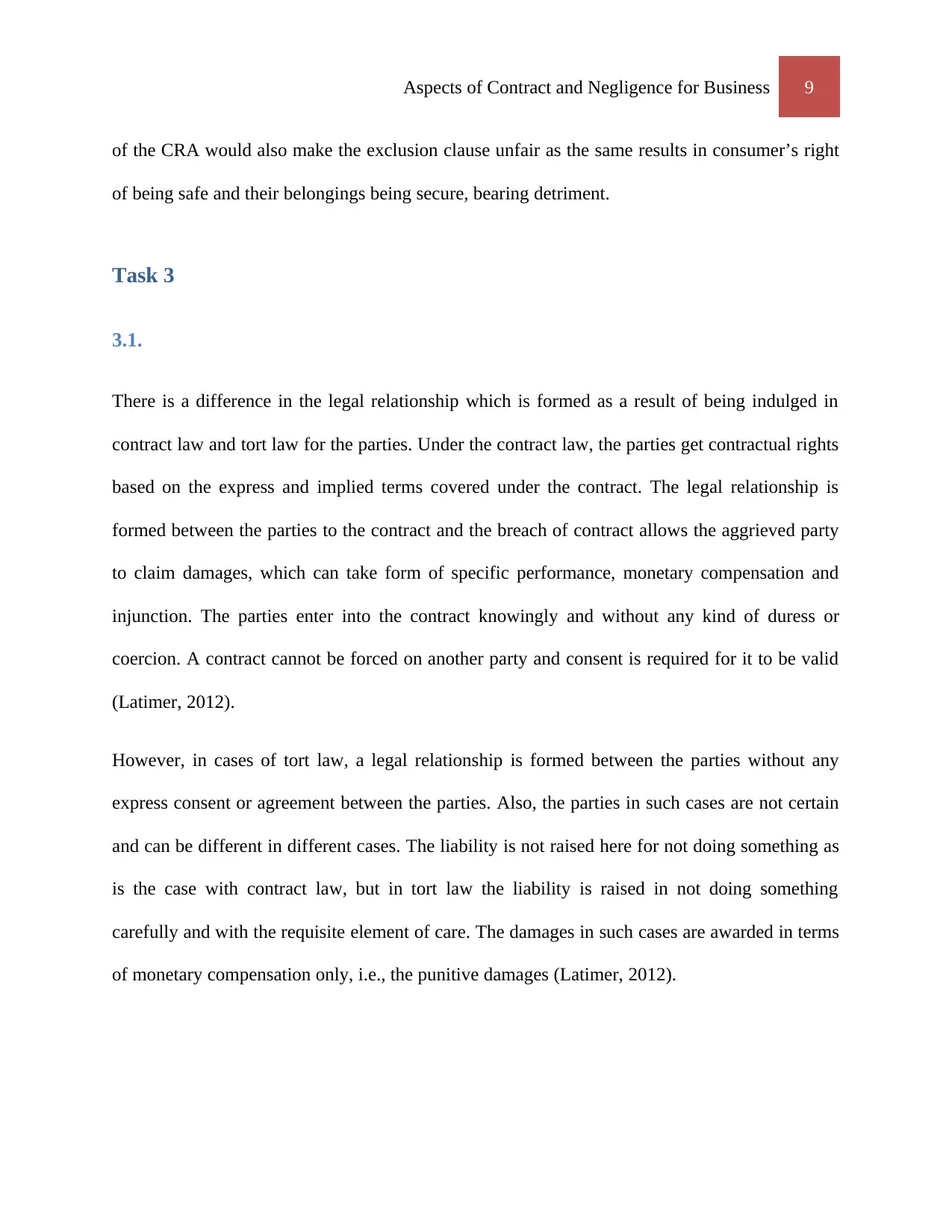
Aspects of Contract and Negligence for Business 9
of the CRA would also make the exclusion clause unfair as the same results in consumer’s right
of being safe and their belongings being secure, bearing detriment.
Task 3
3.1.
There is a difference in the legal relationship which is formed as a result of being indulged in
contract law and tort law for the parties. Under the contract law, the parties get contractual rights
based on the express and implied terms covered under the contract. The legal relationship is
formed between the parties to the contract and the breach of contract allows the aggrieved party
to claim damages, which can take form of specific performance, monetary compensation and
injunction. The parties enter into the contract knowingly and without any kind of duress or
coercion. A contract cannot be forced on another party and consent is required for it to be valid
(Latimer, 2012).
However, in cases of tort law, a legal relationship is formed between the parties without any
express consent or agreement between the parties. Also, the parties in such cases are not certain
and can be different in different cases. The liability is not raised here for not doing something as
is the case with contract law, but in tort law the liability is raised in not doing something
carefully and with the requisite element of care. The damages in such cases are awarded in terms
of monetary compensation only, i.e., the punitive damages (Latimer, 2012).
of the CRA would also make the exclusion clause unfair as the same results in consumer’s right
of being safe and their belongings being secure, bearing detriment.
Task 3
3.1.
There is a difference in the legal relationship which is formed as a result of being indulged in
contract law and tort law for the parties. Under the contract law, the parties get contractual rights
based on the express and implied terms covered under the contract. The legal relationship is
formed between the parties to the contract and the breach of contract allows the aggrieved party
to claim damages, which can take form of specific performance, monetary compensation and
injunction. The parties enter into the contract knowingly and without any kind of duress or
coercion. A contract cannot be forced on another party and consent is required for it to be valid
(Latimer, 2012).
However, in cases of tort law, a legal relationship is formed between the parties without any
express consent or agreement between the parties. Also, the parties in such cases are not certain
and can be different in different cases. The liability is not raised here for not doing something as
is the case with contract law, but in tort law the liability is raised in not doing something
carefully and with the requisite element of care. The damages in such cases are awarded in terms
of monetary compensation only, i.e., the punitive damages (Latimer, 2012).
⊘ This is a preview!⊘
Do you want full access?
Subscribe today to unlock all pages.

Trusted by 1+ million students worldwide
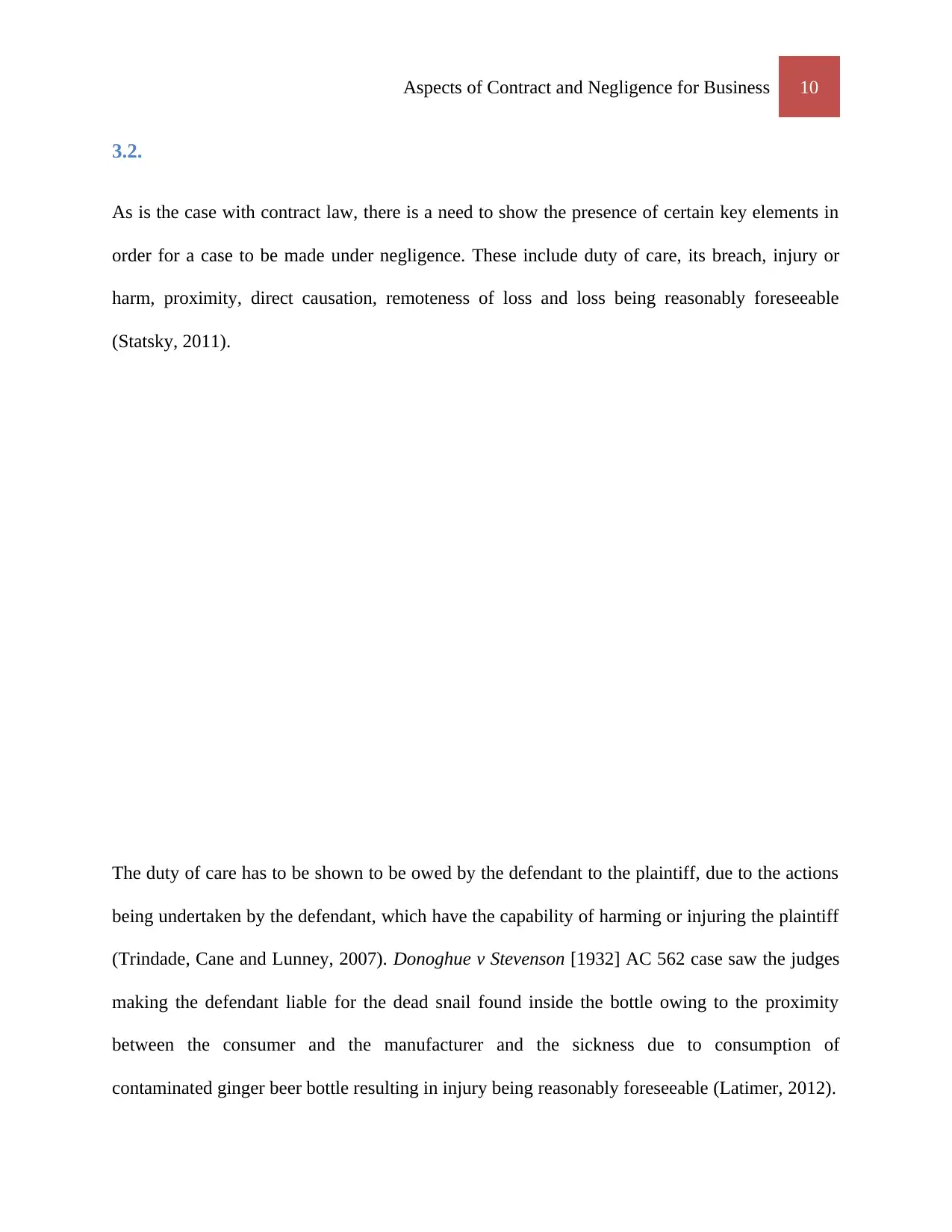
Aspects of Contract and Negligence for Business 10
3.2.
As is the case with contract law, there is a need to show the presence of certain key elements in
order for a case to be made under negligence. These include duty of care, its breach, injury or
harm, proximity, direct causation, remoteness of loss and loss being reasonably foreseeable
(Statsky, 2011).
The duty of care has to be shown to be owed by the defendant to the plaintiff, due to the actions
being undertaken by the defendant, which have the capability of harming or injuring the plaintiff
(Trindade, Cane and Lunney, 2007). Donoghue v Stevenson [1932] AC 562 case saw the judges
making the defendant liable for the dead snail found inside the bottle owing to the proximity
between the consumer and the manufacturer and the sickness due to consumption of
contaminated ginger beer bottle resulting in injury being reasonably foreseeable (Latimer, 2012).
Negligence
3.2.
As is the case with contract law, there is a need to show the presence of certain key elements in
order for a case to be made under negligence. These include duty of care, its breach, injury or
harm, proximity, direct causation, remoteness of loss and loss being reasonably foreseeable
(Statsky, 2011).
The duty of care has to be shown to be owed by the defendant to the plaintiff, due to the actions
being undertaken by the defendant, which have the capability of harming or injuring the plaintiff
(Trindade, Cane and Lunney, 2007). Donoghue v Stevenson [1932] AC 562 case saw the judges
making the defendant liable for the dead snail found inside the bottle owing to the proximity
between the consumer and the manufacturer and the sickness due to consumption of
contaminated ginger beer bottle resulting in injury being reasonably foreseeable (Latimer, 2012).
Negligence
Paraphrase This Document
Need a fresh take? Get an instant paraphrase of this document with our AI Paraphraser
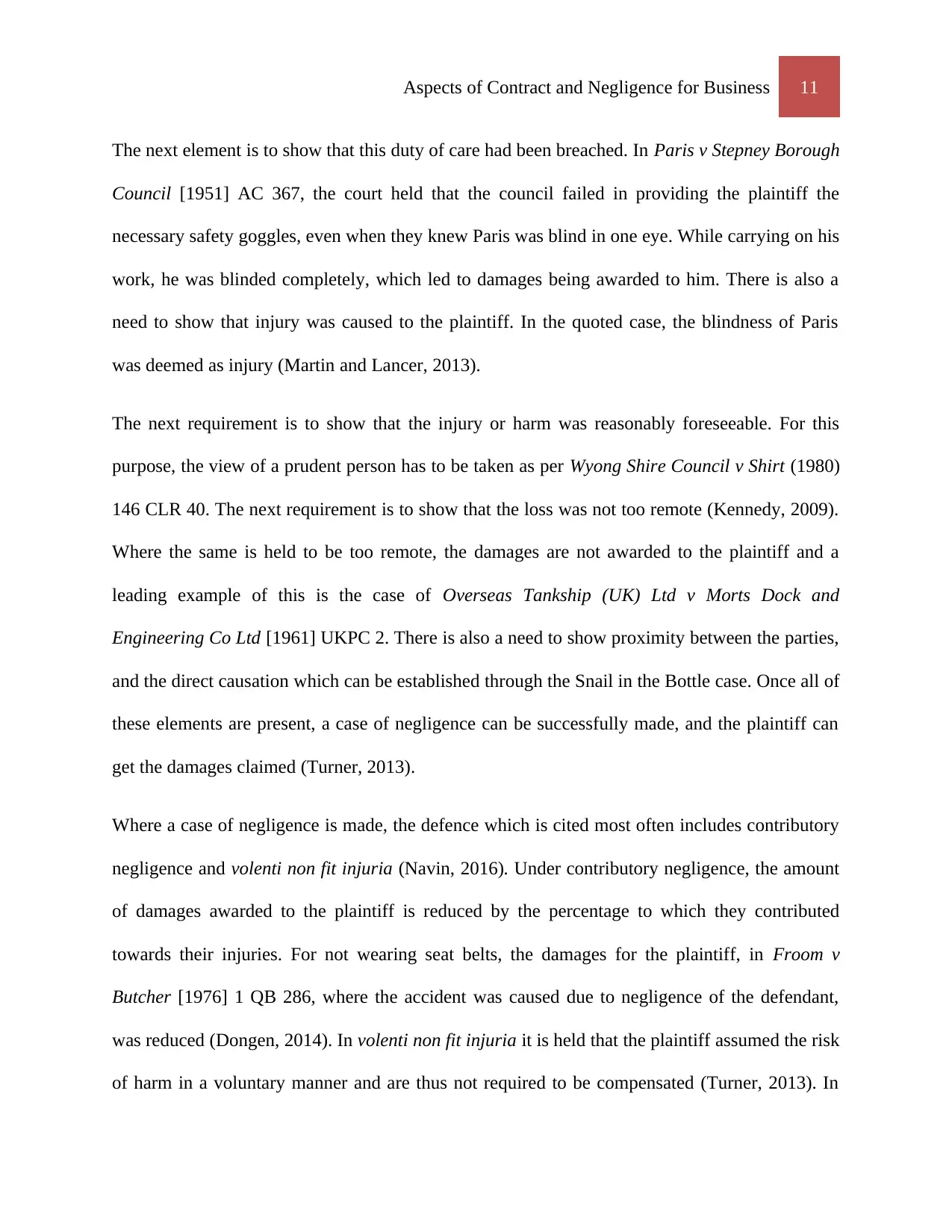
Aspects of Contract and Negligence for Business 11
The next element is to show that this duty of care had been breached. In Paris v Stepney Borough
Council [1951] AC 367, the court held that the council failed in providing the plaintiff the
necessary safety goggles, even when they knew Paris was blind in one eye. While carrying on his
work, he was blinded completely, which led to damages being awarded to him. There is also a
need to show that injury was caused to the plaintiff. In the quoted case, the blindness of Paris
was deemed as injury (Martin and Lancer, 2013).
The next requirement is to show that the injury or harm was reasonably foreseeable. For this
purpose, the view of a prudent person has to be taken as per Wyong Shire Council v Shirt (1980)
146 CLR 40. The next requirement is to show that the loss was not too remote (Kennedy, 2009).
Where the same is held to be too remote, the damages are not awarded to the plaintiff and a
leading example of this is the case of Overseas Tankship (UK) Ltd v Morts Dock and
Engineering Co Ltd [1961] UKPC 2. There is also a need to show proximity between the parties,
and the direct causation which can be established through the Snail in the Bottle case. Once all of
these elements are present, a case of negligence can be successfully made, and the plaintiff can
get the damages claimed (Turner, 2013).
Where a case of negligence is made, the defence which is cited most often includes contributory
negligence and volenti non fit injuria (Navin, 2016). Under contributory negligence, the amount
of damages awarded to the plaintiff is reduced by the percentage to which they contributed
towards their injuries. For not wearing seat belts, the damages for the plaintiff, in Froom v
Butcher [1976] 1 QB 286, where the accident was caused due to negligence of the defendant,
was reduced (Dongen, 2014). In volenti non fit injuria it is held that the plaintiff assumed the risk
of harm in a voluntary manner and are thus not required to be compensated (Turner, 2013). In
The next element is to show that this duty of care had been breached. In Paris v Stepney Borough
Council [1951] AC 367, the court held that the council failed in providing the plaintiff the
necessary safety goggles, even when they knew Paris was blind in one eye. While carrying on his
work, he was blinded completely, which led to damages being awarded to him. There is also a
need to show that injury was caused to the plaintiff. In the quoted case, the blindness of Paris
was deemed as injury (Martin and Lancer, 2013).
The next requirement is to show that the injury or harm was reasonably foreseeable. For this
purpose, the view of a prudent person has to be taken as per Wyong Shire Council v Shirt (1980)
146 CLR 40. The next requirement is to show that the loss was not too remote (Kennedy, 2009).
Where the same is held to be too remote, the damages are not awarded to the plaintiff and a
leading example of this is the case of Overseas Tankship (UK) Ltd v Morts Dock and
Engineering Co Ltd [1961] UKPC 2. There is also a need to show proximity between the parties,
and the direct causation which can be established through the Snail in the Bottle case. Once all of
these elements are present, a case of negligence can be successfully made, and the plaintiff can
get the damages claimed (Turner, 2013).
Where a case of negligence is made, the defence which is cited most often includes contributory
negligence and volenti non fit injuria (Navin, 2016). Under contributory negligence, the amount
of damages awarded to the plaintiff is reduced by the percentage to which they contributed
towards their injuries. For not wearing seat belts, the damages for the plaintiff, in Froom v
Butcher [1976] 1 QB 286, where the accident was caused due to negligence of the defendant,
was reduced (Dongen, 2014). In volenti non fit injuria it is held that the plaintiff assumed the risk
of harm in a voluntary manner and are thus not required to be compensated (Turner, 2013). In
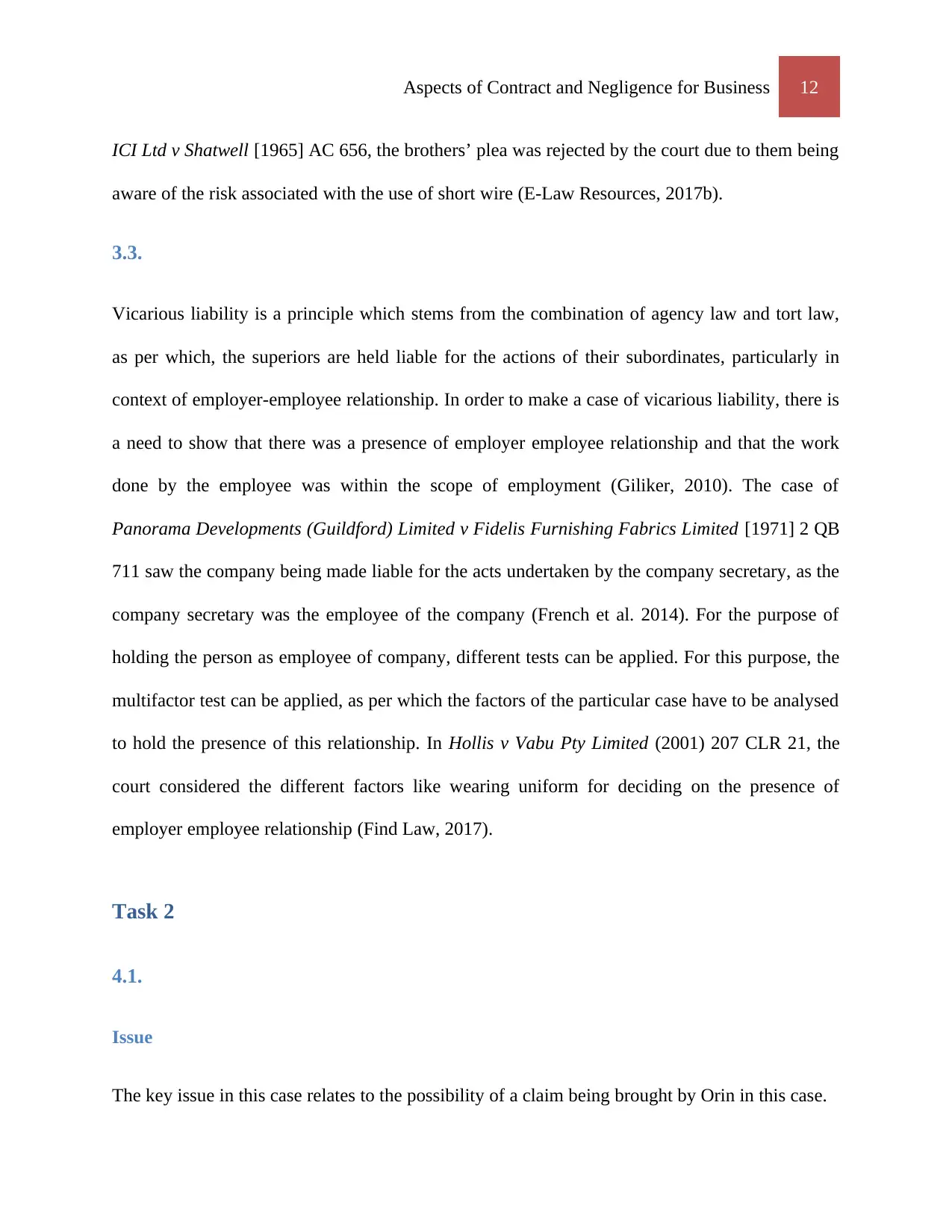
Aspects of Contract and Negligence for Business 12
ICI Ltd v Shatwell [1965] AC 656, the brothers’ plea was rejected by the court due to them being
aware of the risk associated with the use of short wire (E-Law Resources, 2017b).
3.3.
Vicarious liability is a principle which stems from the combination of agency law and tort law,
as per which, the superiors are held liable for the actions of their subordinates, particularly in
context of employer-employee relationship. In order to make a case of vicarious liability, there is
a need to show that there was a presence of employer employee relationship and that the work
done by the employee was within the scope of employment (Giliker, 2010). The case of
Panorama Developments (Guildford) Limited v Fidelis Furnishing Fabrics Limited [1971] 2 QB
711 saw the company being made liable for the acts undertaken by the company secretary, as the
company secretary was the employee of the company (French et al. 2014). For the purpose of
holding the person as employee of company, different tests can be applied. For this purpose, the
multifactor test can be applied, as per which the factors of the particular case have to be analysed
to hold the presence of this relationship. In Hollis v Vabu Pty Limited (2001) 207 CLR 21, the
court considered the different factors like wearing uniform for deciding on the presence of
employer employee relationship (Find Law, 2017).
Task 2
4.1.
Issue
The key issue in this case relates to the possibility of a claim being brought by Orin in this case.
ICI Ltd v Shatwell [1965] AC 656, the brothers’ plea was rejected by the court due to them being
aware of the risk associated with the use of short wire (E-Law Resources, 2017b).
3.3.
Vicarious liability is a principle which stems from the combination of agency law and tort law,
as per which, the superiors are held liable for the actions of their subordinates, particularly in
context of employer-employee relationship. In order to make a case of vicarious liability, there is
a need to show that there was a presence of employer employee relationship and that the work
done by the employee was within the scope of employment (Giliker, 2010). The case of
Panorama Developments (Guildford) Limited v Fidelis Furnishing Fabrics Limited [1971] 2 QB
711 saw the company being made liable for the acts undertaken by the company secretary, as the
company secretary was the employee of the company (French et al. 2014). For the purpose of
holding the person as employee of company, different tests can be applied. For this purpose, the
multifactor test can be applied, as per which the factors of the particular case have to be analysed
to hold the presence of this relationship. In Hollis v Vabu Pty Limited (2001) 207 CLR 21, the
court considered the different factors like wearing uniform for deciding on the presence of
employer employee relationship (Find Law, 2017).
Task 2
4.1.
Issue
The key issue in this case relates to the possibility of a claim being brought by Orin in this case.
⊘ This is a preview!⊘
Do you want full access?
Subscribe today to unlock all pages.

Trusted by 1+ million students worldwide
1 out of 18
Related Documents
Your All-in-One AI-Powered Toolkit for Academic Success.
+13062052269
info@desklib.com
Available 24*7 on WhatsApp / Email
![[object Object]](/_next/static/media/star-bottom.7253800d.svg)
Unlock your academic potential
Copyright © 2020–2026 A2Z Services. All Rights Reserved. Developed and managed by ZUCOL.





